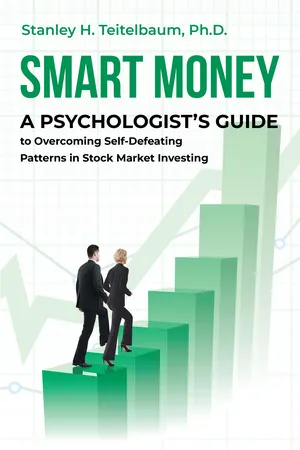
Smart Money
A Psychologist's Guide to Overcoming Self-Defeating Patterns in Stock Market Investing
Stanley H. Teitelbaum Ph.D.
- 226 Seiten
- English
- ePUB (handyfreundlich)
- Über iOS und Android verfügbar
Smart Money
A Psychologist's Guide to Overcoming Self-Defeating Patterns in Stock Market Investing
Stanley H. Teitelbaum Ph.D.
Über dieses Buch
In Smart Money, Dr. Teitelbaum conveys how to identify and overcome our emotional roadblocks that interfere with successful investing, and he explores ways for people to develop greater trust in their ability to navigate their own investment decisions and to reduce their reliance on financial advisors. We all have personality issues that can become impediments to successful investing in the stock market and lead us into pitfalls, like buying high and selling low, following the herd, and searching for the next guru.
Dr. Teitelbaum explains how addressing and overcoming our personal obstacles and implementing a set of guidelines such as distinguishing luck from skill, leaving your ego out of investment decisions, recognizing the value of self-discipline, avoiding self-deception, taming your inner con man and inner critic, and tuning out the media "noise" will enable investors to achieve a greater degree of success.
Praise for Smart Money
"In this painstakingly researched and well-written book, the clinical psychologist Stan Teitelbaum has applied his craft to something all investors know too well—our emotions, and human foibles often diminish our portfolio results. He takes you through countless cases of common mistakes using markets and the heroes of the past. As you read it, you will personally identify with some of his examples and find yourself saying, "That's me!" As a result, you are likely to learn some important money-management lessons along the way."
Byron Wien, vice chairman of Blackstone Private Wealth Solutions Group
"Stanley Teitelbaum's disciplined approach to investing is a wise path for individual investors to build wealth over time. His understanding of the stock market's volatility, its cyclicality, its inherent risks, and its history of performance informs that approach. Dr. Teitelbaum illustrates clearly how our own behavior and our very human impulses often lie at the bottom of our disappointing investment results and how recognizing and controlling our behavior can lead to successful investing."
Al Messina, managing director, Silvercrest Asset Management Group
"This is quite an engaging book about psychological perceptions of risk and its relation to stock investing. It should appeal to both financial types and a general audience."
Edward N. Wolff, professor of economics, New York University